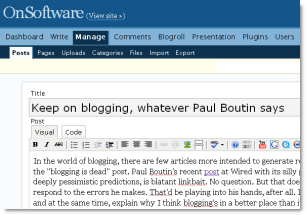 In the world of blogging, there are few articles more intended to generate response and debate than that sturdy perennial, the “blogging is dead” post. Paul Boutin’s recent post at Wired with its silly generalisations, sweeping statements and deeply pessimistic predictions, is blatant linkbait. No question. But that doesn’t mean that those of us who blog shouldn’t respond to the errors he makes. That’d be playing into his hands, after all. I thought I’d tackle a few of his points head-on and at the same time, explain why I think blogging’s in a better place than it ever has been.
In the world of blogging, there are few articles more intended to generate response and debate than that sturdy perennial, the “blogging is dead” post. Paul Boutin’s recent post at Wired with its silly generalisations, sweeping statements and deeply pessimistic predictions, is blatant linkbait. No question. But that doesn’t mean that those of us who blog shouldn’t respond to the errors he makes. That’d be playing into his hands, after all. I thought I’d tackle a few of his points head-on and at the same time, explain why I think blogging’s in a better place than it ever has been.
Thinking about launching your own blog? Here’s some friendly advice: Don’t. And if you’ve already got one, pull the plug.
So, Boutin starts with two pieces of silly advice: don’t start blogging and if you already did, quit now. It’s worth noting that as of this moment, Valleywag is still up and running, and more confusingly includes posts published the day after Boutin offered those handy tips. We trust his resignation will be announced soon.
The blogosphere… has been flooded by a tsunami of paid bilge. Cut-rate journalists and underground marketing campaigns now drown out the authentic voices of amateur wordsmiths… Scroll down Technorati’s list of the top 100 blogs and you’ll find personal sites have been shoved aside by professional ones.
This is Boutin’s main recurring point, known to formal logicians as the “It ain’t like it was in the old days” argument. Closely related to the “You kids don’t know lucky you are” argument, it’s based on a fictitious, rose-tinted view of the olden days along with a paean to some lost hero (in this case “amateur wordsmiths”)
If you look at Technorati’s top 100 from 2005, you’ll see a hell of a lot of names you recognise. A lot of them are still in the top 100, like HuffPo, DailyKos, Gizmodo, Michelle Malkin. Some are new, like Wired and ValleyWag. And some have disappeared because they’ve either been retired (Scobleizer, Baghdad Burning), don’t get updated very often (Maddox) or are just less relevant now (Instapundit). Of course there are some others in there that have gone… but most of them were boring or rubbish anyway. And anyway: Technorati top 100? What is this, the nineties?!
In 2002, a search for “Mark” ranked Web developer Mark Pilgrim above author Mark Twain. That phenomenon was part of what made blogging so exciting. No more. Today, a search for, say, Barack Obama’s latest speech will deliver a Wikipedia page, a Fox News article, and a few entries from professionally run sites like Politico.com
What does that say to me? Thank goodness they fixed the search engine. People use search to find stuff that’s relevant to them and the days have gone when search engine results were controlled by a small cabal of wizards. Well, those days haven’t really gone but that surely would be a good thing. Google launched blog search in 2005 and improved it this year. Yes, it contains professional and newspaper blogs but that’s not because blogging is dead: blogging won the battle with old-style journalism and old-style journalism has embraced blogging. How likely were you to get linked on the NY Times or the Guardian sites in 2005? Not very.
That said, your blog will still draw the Net’s lowest form of life: The insult commenter… That’s why Calacanis has retreated to a private mailing list. He can talk to his fans directly, without having to suffer idiotic retorts from anonymous Jason-haters.
Yeah, because there weren’t annoying trolls or random insulters before 2008, right? These nuisances have always been there and one of the challenges of blogging has always been dealing with them. Calacanis gave up partly because he had grown too popular and partly because (in my opinion) he was just sick of blogging. He ‘retreated’ to his private mailing list because he wanted to quit blogging. Strict moderation and/or obligatory registration, as supported by most big blogs, will deal with the very worst commenters.
Part of [blogging’s] simplicity was a lack of support for pictures, audio, and videoclips.
I have to wonder just what year we’re going back to here. I was embedding audio and images from the moment I started using Blogger and YouTube supported embedding videos in 2005. The technology has been there for over three years and has made blogs richer, both in content and technique. In fact, such advances mean that today’s well-equipped blogger can deliver many different types of content to their audience: life is good for bloggers in 2008.
Boutin’s final argument concerns the brevity of Twitter and how that’s its big advantage when pitched against blogging. But Boutin’s making a fatal mistake here, a class A category error. Boutin, like a lot of ‘seasoned’ bloggers thinks that Twittering is just another type of blogging: a quicker, snappier way of doing what we used to do on blogs. He’s wrong.
Twitter is something completely new and shares much more with instant messaging technology than it does with blogging. You can use Twitter to say “Obama just gave a great speech” or “I just wet myself” or “Man, I hate old style blogging!” and Twitter works perfectly. But just try responding to a post as full of shoddy arguments as Boutin’s was, using Twitter. You’d be there all night.

